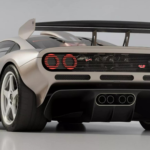There are "more questions than answers" for electric vehicle users in Northern Ireland following a new tax announced in the Budget, a group that represents drivers has said.
The tax for electric and hybrid vehicles was announced by Chancellor Rachel Reeves on Wednesday.
From April 2028, electric car drivers will pay a road charge of 3p per mile, while plug-in hybrid drivers will pay 1.5p per mile, with the rates going up each year with inflation.
Mark McCall, chair of the Electric Vehicle Association of Northern Ireland, said he thought the new tax was "really premature".
"It's going to rely on the individual, I guess, with what miles they do," Mr McCall said.
"But we're already getting questions from members around things like miles in a foreign country – if they drive 2,000 miles across Europe, am I paying for those miles in the UK?"
Mr McCall said it was hard to be exact on the numbers of electric vehicles being driven in Northern Ireland as many are leased to Northern Ireland from companies in Great Britain.
He said his best estimate was "something like 40,000 or 50,00 vehicles with a plug in Northern Ireland".
"EVs are just 5% of vehicles on the UK's roads currently," he said.
"So introducing a pay per mile scheme, even in around two years time, feels really premature to us."
When asked about how the chancellor's plans would work in practice, Northern Ireland Secretary Hilary Benn told BBC NI's Good Morning Ulster programme that "we'll set out further details".
He said as the UK moves from petrol and and diesel cars to more electric cars the the revenue that will be lost as a result must be replaced, adding that all cars have an impact on road surfaces.
In response, Mr McCall said: "If a senior member of the Labour Party can't give us the details, then it won't be a surprise that the rest of us are confused."
He added: "We're really at this consultation process at this moment from now until March next year.
"Our association will certainly be submitting something on that consultation
"At the minute there are more questions than answers."
Drivers will pay the charge based on how many miles they drive from April 2028.
Motorists will have their mileage checked annually, typically during their MOT as is already the case, or for new cars, around their first and second registration anniversary, the Treasury said.
Payment will be integrated into the existing Vehicle Excise Duty system.
Under the measures, an electric car driver clocking up 8,500 miles in the 2028-29 financial year is expected to pay about £255 – about half the cost per mile that petrol and diesel drivers pay in fuel tax.
However, mileage readings will be based on in-vehicle odometers, which the government acknowledges can be subject to tampering, or "clocking".
It recognises that the introduction of the tax "may increase the likelihood of motorists choosing to clock their vehicles", and said it was looking at ways to mitigate this.
The government is now consulting on exactly how the scheme will work.
The Buddy Bear School in Dungannon, County Tyrone, opened in 1993 and is the only school of its kind in Northern Ireland.
All new cars must be electric or hybrid from 2030, but the government could put new taxes on them.
Using state-of-the-art scanning technology, Derry's historic walls have been recreated in a 3D map.
Chancellor Rachel Reeves announced on Wednesday is an extra £370m.
A "priceless" school for children with cerebral palsy has made a fresh bid for Stormont funding.
Copyright 2025 BBC. All rights reserved. The BBC is not responsible for the content of external sites. Read about our approach to external linking.












